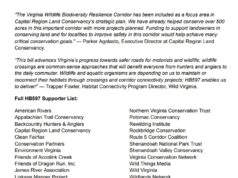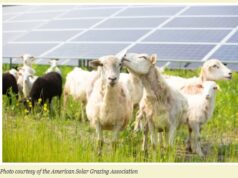The other day, I posted on three articles that explain how “homegrown activism,” “shifting political winds,” Trump administration screwups, changing economics, a fierce and skillful legal battle, the Virginia Clean Economy Act, etc. killed the Atlantic Coast Pipeline (ACP). Along those same lines, today I stumbled on this recent podcast (listen at the link or below), in which “Richmond-based journalist Peter Galuszka and New York Times Renewable Energy Correspondent Ivan Penn” discuss “why Dominion pulled the plug–and what it might mean for the future of energy in Virginia.” Also, see below for some highlights, made much easier by the fact that this podcast (“Bold Dominion“) helpfully produces a transcript of the show. I know, what a concept…just wish all podcasts would do the same! With that, here are a few points that jumped out at me by Galuszka, regarding how the ACP met its demise, as well as a few comments by me in green.
- “[P]eople really realized that the need for the gas isn’t really there…Southern Company dropped out. And then the CEO of Duke was saying she was saying things such as ‘well, we don’t know…'” [I’d argue that the need for gas would be a great deal less, and should be a great deal less, if Dominion were incentivized and/or prodded to invest *heavily* in serious energy efficiency measures. There’s some of that in the VCEA, but we need a lot more, including “decoupling” – “the disassociation of a utility’s profits from its sales of the energy commodity”]
- “...the homeowners, the environmentalists mounted a very clever and long-lasting defense through attrition. And as they stalled things, the pipeline costs went from like 5 billion to 8 billion, and then it just became unviable.” [So basically, the strategy of delaying as long as possible paid off, by raising the cost of the pipeline, by allowing time for legal efforts and for clean energy prices to continue falling, etc.]
- “One of the lead organizations in the fight was based in Charlottesville, was the Southern Environmental Law Center. And it was really their regular legal challenges that forced the issue, and its hard work really leads to results.” [Truly superb work by the Southern Environmental Law Center – kudos!]
- “Well, you know, you’ve got a common enemy, you band forces. And that seems to happen. Take for example, the social justice people. Union Hill in Buckingham County, is a largely African-American community and Dominion wanted to put a large compressor station right there. And, you know, typically you can–this happens over and over again in the country, that a big, you know, annoying energy infrastructure projects always go where poor people live. So that is a big victory for them. And as far as the property right owners, I mean, a lot of them for example, are retirees who are well-off who wanted vacation homes or retirement homes in bucolic Virginia, and find they’re going to be right on top of a pipeline, and also the Wintergreen crowd of affluent people, condos and golfers and skiers were very upset because the pipeline would go right by the entrance to Wintergreen. So you’re right, you’re three disparate groups that banded together, and they all worked together. And that’s one reason the pipeline’s dead. But I think the big reason is economics.” [I’m not sure these different groups worked together consciously, but certainly it was helpful to have different types of folks opposing the ACP from different directions.]
- “…as the gas prices crashed, because there were so much, you know, they couldn’t pay their loans. And one of the biggest telling factors for just a few weeks ago, Chesapeake Energy, or the original pioneer cracker, they went bankrupt. So once again, you drag things out long enough, the economics of energy change, they always change.” [I’d also note that the COVID-19 pandemic and resultant economic decline has cut demand for energy, including for natural gas, around the world. And who knows how long that will continue for…]
- “…the Clean Economy Act sort of postulates a number of reductions in carbon. And it’s going to do so under a guaranteed rate of return for Dominion, which can be–don’t hold me to it, 10 to 14%. And so that’s what Dominion wants…I think a whole Green New Deal approached, as you might say, by AOC, something like that will not fly in Virginia. I mean, it’s just too progressive. So you know, got to look at things realistically–the Clean Economy Act is probably as good as it’s going to get for a while, unless there’s a bigger turnover and the General Assembly, and more progressive politicians are elected. Because I mean, much of the old structure with its, you know, very tight committee’s abilities to, you know, destroy bills before they are born, that still exists.” [I couldn’t agree more with Galuszka on this point, that the VCEA was the best that realistically could possibly pass in Virginia at this time – we’ll see about years to come – and that the Green New Deal never had a chance of passing in the 2020 session. However, I do think it’s possible to strengthen VCEA – which is already pretty strong – in a variety of ways in coming years, including incorporation of some “Green New Deal” elements.]
- And a good point from Ivan Penn: “I mean, this is a major project. And it’s clearly another sign that the economics for fossil fuels are continuing to hit headwinds. The utilities would argue that, well, that problem was created because the environmental community brought all of these legal challenges which caused delays. But some of that clearly also is because there is a case to be made that there are alternatives…[Dominon is] doing some very innovative projects on the renewable side. And so you can see that the transition is more significant today than was anticipated at this point in time. The pipeline just–the end of that project just highlights the fact that these renewable technologies have really hit a watershed moment.” [I don’t really agree that Dominion is doing “some very innovative projects on the renewable side,” but I do agree that “renewable technologies have really hit a watershed moment.” What worries me is that Dominion could end up giving us slower development of renewable energy resources, at higher cost, and in a more top-down/centrally controlled way than we need and that we could get. We’ll see if public pressure, as well as pressure from major corporate power consumers such as Amazon, Google, etc. lead to a much more robust “distributed power” sector in Virginia, or if Dominion manages to beat back that pressure or stave it off.]




![[UPDATED 1/29/26] Audio: Sen. Tim Kaine Talks to Blue Virginia About His “Five-Point Plan” to Fight Trump’s Orban-Like Assault on US Democracy; Civil Disobedience a la MLK Jr.; Trump’s Bogus “Energy Emergency”; the Crucial Importance of the 2025 VA Elections; etc.](https://bluevirginia.us/wp-content/uploads/2025/02/kaineinterview2-238x178.jpg)







